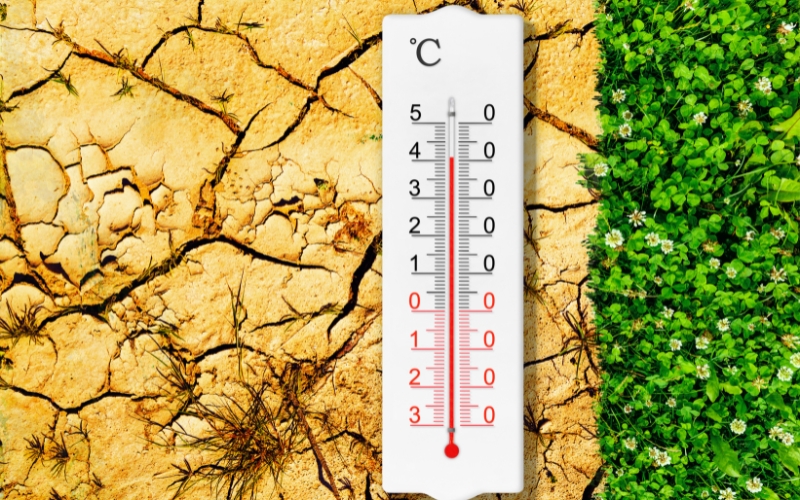Climate change, driven by human activities such as burning fossil fuels, deforestation, and industrial processes, is profoundly impacting global ecosystems. These changes are causing shifts in weather patterns, temperature increases, and more frequent extreme weather events, all of which have significant effects on biodiversity, habitats, and ecosystem services. Understanding these impacts is crucial for developing strategies to mitigate and adapt to the challenges posed by climate change.
1. Temperature Changes and Species Distribution
One of the most direct effects of climate change is the alteration of temperature patterns, which affects the distribution of species and ecosystems.
Key Points:
- Shifting Habitats: As temperatures rise, many species are moving toward higher altitudes or latitudes in search of cooler environments. This shift can disrupt existing ecosystems and lead to the decline of species unable to migrate.
- Altered Life Cycles: Changes in temperature can affect the timing of biological events, such as breeding, migration, and flowering. These shifts can lead to mismatches between species and their food sources or pollinators, disrupting ecological relationships.
2. Melting Ice and Rising Sea Levels
Climate change is causing the polar ice caps and glaciers to melt, leading to rising sea levels and significant impacts on marine and coastal ecosystems.
Key Points:
- Habitat Loss: Rising sea levels can inundate coastal habitats such as mangroves, salt marshes, and coral reefs, leading to loss of biodiversity and ecosystem services such as coastal protection and fish nurseries.
- Ocean Acidification: Increased levels of carbon dioxide (CO2) in the atmosphere lead to higher concentrations of CO2 in the oceans, causing acidification. This process affects marine organisms, particularly those with calcium carbonate shells or skeletons, such as corals and shellfish.
3. Extreme Weather Events
Climate change is increasing the frequency and intensity of extreme weather events, such as hurricanes, floods, droughts, and heatwaves.
Key Points:
- Ecosystem Damage: Extreme weather events can cause immediate and severe damage to ecosystems, such as forest fires, flooding of wetlands, and coral bleaching during heatwaves.
- Long-Term Stress: Repeated exposure to extreme weather can weaken ecosystems, reducing their resilience and ability to recover from disturbances.
4. Changes in Precipitation Patterns
Climate change is altering precipitation patterns, leading to changes in water availability that affect ecosystems.
Key Points:
- Droughts: Prolonged droughts can stress water-dependent ecosystems, leading to reduced biodiversity, decreased agricultural productivity, and increased risk of wildfires.
- Flooding: Increased precipitation and more intense storms can lead to flooding, which can erode soil, wash away nutrients, and disrupt terrestrial and aquatic ecosystems.
5. Impact on Biodiversity
Biodiversity, the variety of life on Earth, is being significantly affected by climate change, with many species facing increased risk of extinction.
Key Points:
- Species Extinction: Climate change is projected to be a leading cause of species extinction in the coming decades. Species with limited mobility, specialized habitats, or narrow temperature tolerances are particularly vulnerable.
- Genetic Diversity: Loss of species also means a loss of genetic diversity, which is crucial for the adaptability and resilience of ecosystems in the face of changing conditions.
6. Disruption of Ecosystem Services
Ecosystem services, the benefits humans derive from ecosystems, are being disrupted by climate change.
Key Points:
- Food Security: Changes in temperature and precipitation affect agricultural productivity, impacting food security. Fisheries are also affected by changing ocean temperatures and acidification.
- Water Resources: Climate change affects the availability and quality of freshwater resources, crucial for drinking water, agriculture, and industry.
- Health Impacts: Altered ecosystems can affect human health by influencing the spread of diseases, reducing air and water quality, and impacting mental health through the loss of natural spaces.
Conclusion
The effects of climate change on global ecosystems are profound and far-reaching, affecting species distribution, habitat integrity, biodiversity, and the essential services ecosystems provide. Addressing these impacts requires concerted global efforts to reduce greenhouse gas emissions, protect and restore natural habitats, and develop adaptive strategies to enhance the resilience of ecosystems and human communities. By understanding and mitigating the effects of climate change, we can work towards preserving the health and diversity of our planet for future generations.


Be First to Comment